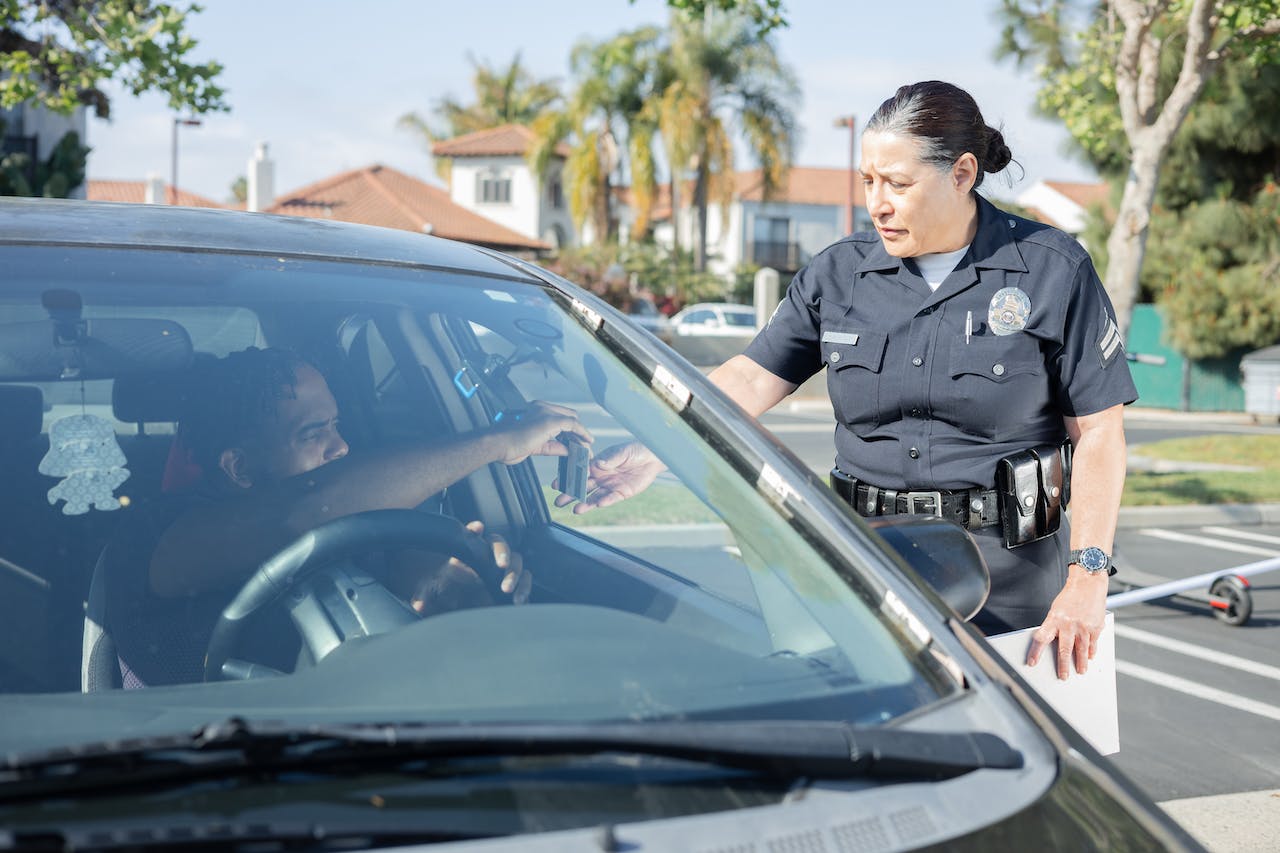Kansas Driving Without A License
This article aims to delve deep into the complexities of the legal consequences, penalties, and potential repercussions associated with Kansas driving without a license.
Author:Mia ThompsonReviewer:Calvin PenwellMar 27, 20241.6K Shares26.2K Views

In the vast expanse of Kansas, where the amber waves of grain stretch as far as the eye can see, one may find themselves contemplating the vast and intricate legal labyrinth surrounding the act of driving without a license. This article aims to delve deep into the complexities of the legal consequences, penalties, and potential repercussions associated withKansas driving without a license.
From the types of licenses available to the impact on insurance and the judicial system, you will explore the many facets of this issue, ensuring that every Kansan knows what's at stake when they take the wheel without a valid license.
Importance Of A Valid Driver's License In Kansas
In the vast and diverse landscape of Kansas, having a valid driver's license is not just a legal requirement; it is a critical aspect of responsible and safe driving. The driver's license is not only utilized for the right to drive but has become a document that is accepted as proof of lawful presence and identification.
Ensuring Road Safety
Road safety is a significant justification for driver's licenses. Driver's license applicants must pass written and practical examinations on traffic laws, road signs, and safe driving. This assures that licensed drivers know the traffic laws, decreasing accidents caused by ignorance or lack of training.
A valid driver's license ensures you meet state competency criteria. It shows you understand traffic rules, safe driving, and legal driving. This keeps drivers and other road users safe.
Legal Compliance And Accountability
Driving without a license is illegal. In Kansas, like in other states, driving without a license is illegal. As said, it can lead to fines, penalties, and jail time.
A valid driver's license shows your legal compliance and accountability. It shows that you are a responsible and law-abiding motorist by following the rules. Legal responsibility is essential to traffic order and public safety.
Access To Various Opportunities
A valid driver's license shows your ability to drive safely and responsibly and opens many doors. Driver's licenses are required for many Kansas employment, notably those in transportation and delivery. It may be required for higher education or training programs.
With a driver's license, people may travel freely and easily. It allows you to go to work, perform errands, and visit the Sunflower State without public transit or help.
Kansas Driving Without A License - Legal Consequences
Driving without a valid license in Kansas is not only a violation of state laws but also a practice that can have far-reaching legal consequences. If you are caught driving without a license in Kansas for the first time, you might face a fine of $100 to $1,000 and a prison term of five days to six months. If this is your second violation, you will face the same penalties, with the addition of 90 days to your license suspension.
Criminal Penalties And Fines
Driving without a valid license in Kansas is considered a criminal offense. The severity of the penalties for this offense can vary depending on the circumstances and the driver's history of violations. The potential consequences may include fines, probation, community service, or even incarceration.
Driving without a license can result in fines of several hundred to several thousand dollars. Fines can strain a person's finances and have long-term effects.
Probation - Courts may sentence with probation. Probation usually requires reporting to a probation officer, attending therapy or educational programs, and not committing subsequent offenses.
Community Service - Courts may order unlicensed drivers to conduct community service. The criminal gets punished and gives back to the society.
Incarceration - Repeat or severe criminals may be imprisoned. This involves jail time, which can impair personal and professional life.
Vehicle Impoundment
Kansas police can impound a car driving without a license. Vehicle owners must pay for impoundment and storage in addition to penalties and court expenses.
Vehicle impoundment may be a hassle since it requires paying fees and fines, producing verification of a valid license, and following court directions to reclaim the vehicle.
Traffic Citations And Legal Records
When stopped by law enforcement for driving without a valid license, individuals will receive a traffic citation. These citations are not just pieces of paper; they create a legal record of the offense. Accumulating multiple traffic citations, especially for the same offense, can lead to more severe penalties and legal consequences.
Having a record of driving without a valid license can affect an individual's driving history and may lead to increased scrutiny by law enforcement. It can also impact future court proceedings, potentially resulting in harsher penalties for subsequent offenses.
Suspension Or Revocation Of Driving Privileges
Driving without a license can lead to license suspension or revocation, which is severe. This involves losing Kansas driving privileges. The driver's history of offenses and conditions determine the suspension or revocation length.
Restoring driving privileges can take time and money, including instructional programs, penalties, and court compliance. Driving without a license when suspended or revoked might result in harsher sanctions.
Driving Without License In Kansas Enforcement And Penalties
Generally speaking, a valid driver's license must be held by the individual operating a motor vehicle on a Kansas roadway. If you don't, you risk being found guilty of a misdemeanor.
License Not In Possession
A conviction is only sometimes the consequence of failing to provide a legal license when asked by an officer. The charge should be dropped if the motorist can provide a valid driver's license at the time of the request in court or at the police station. On the other hand, a driver found guilty risks a maximum $500 fine and up to 90 days in prison.
Driving Without A Valid License
In Kansas, driving without a license is a class B misdemeanor, punishable by up to $1,000 in fines and six months in prison for first-time offenders. In addition, there will be a 90-day license suspension for the infraction.
The Kansas Department of Revenue sets up a computerized profile for the driver and "suspends" them from using or getting a driver's license for ninety days, even though it doesn't make sense to suspend a license that doesn't exist.
The primary purpose of this electronic profile is to impose obligatory prison time and other penalties for "driving while suspended" on unlicensed drivers who operate a vehicle during the 90-day suspension.
Exceptions
Subject to Kansas age limits, non-resident drivers having valid driver's licenses from their home state or nation may operate a vehicle in the state without a Kansas license.
The Kansas Department of Revenue may provide permission to non-residents whose home country does not need licensing for them to operate a vehicle without a license temporarily. It is also legal for farmers in Kansas to operate tractors between fields without a license.
How Do You Apply For A Driving License In Kansas?
Whether you were born and raised in Kansas or are new to the area, you should know that obtaining a driver's license is a simple process. You just need to study hard for the written exam! After all, you'll face severe fines, maybe jail time, and a suspended license if you're caught driving without a valid Kansas driver's license.
Determine Your Eligibility
Before you begin the application process, it's essential to ensure that you meet the eligibility criteria for the specific type of driver's license you are seeking. The eligibility criteria can vary based on factors such as your age, residency status, and the type of license you require. For instance, the requirements for obtaining a Class C (regular) driver's license may differ from those for a Class M (motorcycle) license or a Commercial Driver's License (CDL).
Visit the official website of the Kansas Department of Revenue or contact your local DMV office to verify your eligibility based on your circumstances.
Gather Required Documents
To apply for a Kansas driver's license, you will need to provide several documents to verify your identity, residency, and other necessary information. Commonly required documents include.
Proof of identity, such as a birth certificate, passport, or immigration documents.
Proof of residency, which can include utility bills, rental agreements, or other documents that confirm your Kansas address.
Your Social Security number or proof of lawful presence for non-U.S. citizens.
Any additional documentation required for specific licenses or endorsements.
Ensure you have all the necessary documents in hand before heading to the DMV office to avoid any delays in the application process.
Prepare For The Written Knowledge Test
The written knowledge test is a crucial step in the application process. It assesses your understanding of traffic laws, road signs, and safe driving practices. The questions are typically based on the information provided in the Kansas Driver's Handbook, which is readily available online or at DMV offices. Studying the handbook is essential for passing the test.
Visit A Local DMV Office
With your required documents and knowledge test preparation in order, it's time to visit a local DMV office to complete your driver's license application. You can find the nearest DMV office in your area through the official website or by contacting the Kansas Department of Revenue.
At the DMV office, you will complete the application forms, provide your personal information, and submit the necessary fees.
Take The Written Knowledge Test
During your visit to the DMV office, you will be required to take the written knowledge test. The test is typically computer-based and consists of multiple-choice questions. Passing this test is a prerequisite for advancing to the next step of obtaining your driver's license.
Schedule And Complete The Road Skills Test
Once you have successfully passed the written knowledge test, the next step is to schedule and complete the road skills test. During this test, you will demonstrate your ability to operate a motor vehicle safely and in accordance with traffic laws.
It's advisable to practice your driving skills thoroughly before taking the road skills test. You can seek guidance from a qualified instructor or take driving lessons to increase your chances of success.
Pass The Vision Test
As part of the application process, you will undergo a vision test to ensure that your eyesight meets the minimum standards required for safe driving. If you use corrective lenses, make sure to wear them during the test.
Pay The Applicable Fees
Obtaining a driver's license in Kansas involves various fees, which can vary depending on the type of license and endorsements you require. Be prepared to pay the required fees at the DMV office. Check the current fee schedule on the Kansas Department of Revenue's website to ensure you have the necessary funds.
Receive Your Kansas Driver's License
After completing the written knowledge test, road skills test, and vision test and paying the required fees, you will receive your Kansas driver's license. Congratulations! You are now a legal and licensed driver in the state.
Kansas Driving Without A License - FAQs
What Is The Legal Penalty For Driving Without A License In Kansas?
Driving without a license in Kansas can result in fines, probation, community service, or even incarceration, depending on the circumstances.
How Does Driving Without A License Affect Insurance In Kansas?
Driving without a license can lead to increased insurance premiums or difficulties in obtaining coverage, as insurance providers may view you as a high-risk driver.
What Are The Consequences Of Having Your Vehicle Impounded For Driving Without A License In Kansas?
Vehicle impoundment results in additional costs for the vehicle owner, including fees for towing and storage, creating a financial burden.
Can You Drive With An Out-of-state License In Kansas?
Kansas generally allows individuals with valid out-of-state licenses to drive in the state, but they must follow Kansas traffic laws and regulations.
What Is The Process For Reinstating Driving Privileges After They Are Suspended For Driving Without A License In Kansas?
Reinstating driving privileges often involves completing educational programs, paying fines and fees, and demonstrating compliance with court orders, making it a lengthy and costly process.
Conclusion
Driving without a valid license in Kansas carries significant legal consequences, including criminal penalties, potential vehicle impoundment, increased insurance premiums, traffic citations, and the suspension or revocation of driving privileges.
Individuals in Kansas must understand the importance of adhering to the state's licensing requirements and ensuring they have a valid driver's license to avoid the pitfalls associated with "Kansas driving without a license." Responsible and lawful driving in the Sunflower State begins with obtaining and maintaining a valid driver's license.

Mia Thompson
Author
Mia Thompson is a versatile writer at Kansas Press, delving into a range of topics including news, spiritual exploration, astrology, and numerology. With a passion for delivering insightful and informative content, Mia's articles provide readers with valuable perspectives and thought-provoking insights into these intriguing subjects.
She is dedicated to creating content that resonates with readers and fosters a deeper understanding of complex topics.

Calvin Penwell
Reviewer
Since diving into numerology in 1997, my path has been marked by extraordinary encounters and insights. A pivotal moment was uncovering a forgotten numerological manuscript in a tucked-away Italian library, which deepened my connection to the ancient wisdom of numbers. Another transformative experience was a meditation retreat in Nepal's tranquil mountains, where I honed my intuition and the art of interpreting numerical vibrations.
These adventures have not only enriched my numerological practice but also my ability to guide others towards understanding their destiny and life's purpose. My approach is deeply personal, rooted in a blend of historical knowledge and intuitive insight, aimed at helping individuals find their alignment with the universe's abundant energies. My mission is simple: to share the power of numerology in illuminating paths to abundance and fulfillment.
Latest Articles
Popular Articles


